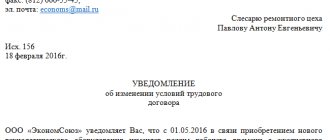Article 57 of the Labor Code of the Russian Federation does not contain an imperative requirement for the employer to draw up job descriptions (or include a detailed list of the employee’s job responsibilities in the text of the employment contract). The Labor Code of the Russian Federation defines only the mandatory minimum - according to Part 2 of Article 57 of the Labor Code of the Russian Federation, only the labor function must be specified in the employment contract (work according to the position in accordance with the staffing table, profession, specialty indicating qualifications; the specific type of work assigned to the employee).
The presence of a job description is currently a right, but not an obligation of the employer, which is confirmed, inter alia, by the letter of the Federal Service for Labor and Employment dated August 9, 2007 N 3042-6-0, according to which “the mere absence of a job description should not be regarded as a violation of labor legislation and entail liability, but may have negative consequences in the form of the employer making illegal decisions due to its absence.”
Exception!
Clause 7 of the Decree of the Government of the Russian Federation dated June 23, 2011 N 498 (as amended on September 09, 2015) “On some issues of private detective (detective) and private security activities” directly provides for the licensee to have a job description approved by him on the actions of employees to ensure internal and access control at each security facility. There is judicial practice in administrative cases, where a private security company is charged, among other things, with the absence of the specified job description, as committing an administrative offense under Part 2 of Art. 5.27 of the Code of the Russian Federation on Administrative Offences.
In practice, a job description is an effective and necessary applied tool for regulating labor relations between an employee and an employer. In certain circumstances, a properly prepared job description can be used as an argument in the event of a dispute, both by the employee and the employer.
According to Article 8 of the Labor Code of the Russian Federation, the employer (except for individuals who are not individual entrepreneurs) has the right to adopt local regulations that comply with the current labor legislation and do not worsen the position of the employee in comparison with the established labor legislation.
Since the procedure for drawing up instructions is not defined at the legislative level, each company is absolutely free to choose the procedure for its execution. For instructions, as for a corporate document, other names can be used, for example, “position description”, “work instructions”, “job regulations”, “list of employee responsibilities”, “functional responsibilities for the position”.
What is the liability for failure to comply with job descriptions?
As an example, let us cite the provisions of Art. 50 of the Law “On Service in Internal Affairs Bodies...” dated November 30, 2011 No. 342-FZ. Additional penalties are provided for employees of internal affairs bodies in the form of:
- transfer to a lower position in the internal affairs bodies.
- severe reprimand;
- warnings about incomplete professional compliance;
So, violation of the job description entails liability under the Labor Code of the Russian Federation, i.e.
e. disciplinary, the most severe penalty within which is dismissal. Responsibility for non-compliance with the job description in the form of dismissal under the relevant articles of the Labor Code of the Russian Federation The Labor Code of the Russian Federation lists cases of non-compliance with the requirements specified in the DI, which will entail penalties in the form of dismissal (Art.
192). At the same time, cases of failure to fulfill work duties, cases of violation of such duties, as well as some special grounds for termination of an employment agreement are distinguished.
The grounds for dismissal as a type of penalty include the following norms from Part.
What to do if there is neither an employment contract nor a job description (see
You say yourself that you are officially employed. Sitting and fooling around won't work.
If the documents were not signed, then they are still actually allowed to work.
The employer faces possible inspection and a fine, and the inability to hold you accountable for violation of discipline or failure to perform duties. You didn’t sign any documents, which means they won’t prove that they are familiar with the responsibilities.
Any job involves fulfilling responsibilities. Even if your responsibilities were explained to you in words, it’s better not to risk doing nothing, because you could end up without a job.
If they don’t give you documents (contract, job responsibilities) - maybe they just have doubts?! I wonder about other employees too? But still there must be registration, because this is an important condition for establishing civil law relations between the employee and the employer. But what if something happens?
Therefore, you still need to simply familiarize yourself with these documents. Well, or just use tricks (if you don’t want to go into conflict) - take a certificate for a kindergarten (about your place of work), or for a social service (about your salary, you can say about some accruals while you didn’t work there), a certificate for work husband, etc.
And then after some time it will be possible to get a 2-NDFL certificate (you can say for a loan)
The legal nature of the job description and its place among company documents
Our next step will be to create a classification of employer regulations according to the criterion of mandatoryness: 2). Others, they can also be called advisory, which the employer can take to solve emerging problems in relations with employees.
For example: personnel regulations, regulations on the legal department and, of course, job descriptions. The absence of a job description may lead to the fact that a lawyer, as a representative of the employer, will not be able to: - reasonably refuse to hire an applicant; - terminate the employment contract with the employee if the test result is unsatisfactory (Article 71 of the Labor Code of the Russian Federation), that is, it will not be able to objectively evaluate the employee’s activities during the probationary period; - find legal grounds for
Violations of labor protection requirements
The Labor Code of the Russian Federation imposes an obligation on all employers to ensure labor protection. Let's make a rating of the top 10 typical violations in this area (the rating is based on statistics from Rostrud, judicial and law enforcement practice).
Lack of training and testing of knowledge on labor protection for managers
A practical situation.
The director of the company changes: a decision of the founders, an employment contract, an order, etc. are being prepared. And directors often forget about occupational safety training. Meanwhile, the obligation to train the director at the training center is provided for in Art. 212 of the Labor Code of the Russian Federation and the Procedure for training in labor protection, approved by Resolution of the Ministry of Labor of Russia dated January 13, 2003 No. 1/29 (hereinafter referred to as the Procedure). Moreover, not only the director, but also all managers who organize the work of subordinates must undergo such training.
In the absence of protocols for testing knowledge of labor protection requirements and a certificate of knowledge testing, the inspector can not only fine the company, but also remove managers from work (Article 76 of the Labor Code of the Russian Federation).
Lack of training and testing of knowledge on labor protection of ordinary workers
If in relation to managers the lack of training can still be understood (certain costs must be incurred to train workers in a training center), then the reasons for the lack of training and testing of occupational safety knowledge for ordinary workers are not clear. After all, no costs are required in this case, just do the following:
- Organize an internal commission of employees trained in specialized training centers.
- Develop a program and conduct training and knowledge testing within the company.
- After this, draw up protocols and certificates according to the samples given in the Appendices to the Procedure.
Isn't it a simple procedure? However, this violation is the second in the ranking, and for it employers are also held accountable, and employees are suspended from work.
Occupational safety specialist: regulations
Lack of special assessment of working conditions
Often employers do not conduct a special assessment because it is a costly exercise. The only reassuring thing is that you only need to spend money once every five years. But there is also a failure to carry out a special assessment due to ignorance.
A practical situation. A small company has only office staff. A special assessment was not carried out because they thought that this was not required for office staff. During the inspection, the inspectorate issued a fine, because according to the Federal Law “On Special Assessment of Working Conditions” dated December 28, 2013 No. 426-FZ, all jobs are subject to special assessment, except for remote workers and homeworkers.
Lack of medical examinations for workers
Unlike the previous three violations, the lack of medical examinations does not always lead to administrative liability, because not all employees are subject to medical examinations. In order not to make a mistake in this matter, employers should carefully study not only the Order of the Ministry of Health and Social Development of the Russian Federation dated April 12, 2011 No. 302n, dedicated to medical examinations, but also other regulations. For example, SanPiN 2.2.2/2.4.1340-03 dated 06/03/2003. According to this document, persons who work with computers more than 50% of their working time must undergo mandatory medical examinations.
If medical examinations are mandatory for workers, but there are no documents confirming their completion, the labor inspector can hold the company accountable and impose a fine, as well as remove workers from work.
Lack of personal protective equipment
Failure to provide protective clothing is a common violation in the manufacturing sector. His reasons are clear: issuing protective clothing requires costs. But sometimes special clothing is not provided even out of ignorance. For example, according to Order of the Ministry of Labor of Russia dated December 9, 2014 No. 997n, the driver, the janitor, the watchman, and the cleaning lady must wear special clothing.
Therefore, employers should check whether the company has such and other employees who are required to wear protective clothing. And if there is, then workers should be dressed in special clothing and make notes on the personal card for recording the issuance of PPE in accordance with Order of the Ministry of Health and Social Development dated June 1, 2009 No. 290n, otherwise fines cannot be avoided.
Concealing an accident
Accidents are subject to investigation - Art. 227 Labor Code of the Russian Federation. It happens that companies do not investigate them intentionally in order to make their lives easier. What could be the consequences? For example, an employee fell during working hours and broke his leg. The employer did not investigate the accident and asked the employee to tell the hospital that he had fallen at home. The worker did just that, but the leg healed incorrectly and required longer treatment. The employee learned that various guarantees are provided for in the event of an accident at work, and filed a complaint with the labor inspectorate that the accident was not investigated. This is a clear case of a cover-up.
But it happens that the company did not even think about hiding the accident.
A practical situation.
A serious accident occurred in the company, which means that government agencies should be notified within 24 hours (Article 228.1 of the Labor Code of the Russian Federation). The employer notified everyone except the union association, thinking that if there is no union in the company, then there is no point in notifying this body. But the labor inspector considered this case to be hidden, since notification to the association of trade unions is mandatory in this case as well. What are the consequences? Not only the fine, but also the fact that the accident is investigated not by the commission, but by the labor inspector alone.
Lack of compensation for harmful working conditions
If working conditions are harmful, then the company must provide the employee with compensation (additional pay, shortened working hours, additional leave in accordance with Article 117, 147 of the Labor Code of the Russian Federation). It is clear that companies often do not provide compensation to workers due to a desire to save money. But such savings can lead to considerable financial costs. Employees can go to court and recover from the employer not only compensation, but also interest under Art. 236 of the Labor Code of the Russian Federation, and compensation for moral damage (Article 237 of the Labor Code of the Russian Federation).
Lack of occupational safety specialist
The position of occupational safety specialist is introduced in an organization when the number of employees exceeds 50 (Article 217 of the Labor Code of the Russian Federation). If the company is small, then it is not necessary to enter the whole rate; you can hire an external or internal part-time employee for part of the rate. And if the company has grown, then to calculate the number of employees, you should use the Intersectoral headcount standards approved by Resolution of the Ministry of Labor of Russia dated January 22, 2001 No. 10.
The labor inspector will definitely ask for a staffing table. If the document does not contain the title of occupational safety specialist, the company will be fined.
Lack of labor protection instructions
Some companies do not develop labor safety instructions, although according to Art. 212 of the Labor Code of the Russian Federation are required to do this. Why they don’t do this is unclear, because this does not require any costs.
What should be done:
- Develop documents using the Methodological Recommendations for the Development of Labor Safety Instructions, approved by the Ministry of Labor of the Russian Federation on May 13, 2004, and standard industry instructions.
- Approve them by order.
- Also approve the list of instructions by order.
- Fill out the log of instructions and the log of the issuance of labor protection instructions.
This way you will save the company from being fined for lack of instructions.
Lack of safety training
The obligation to provide instructions on labor protection is provided for in Art. 212 of the Labor Code of the Russian Federation and the Procedure. The reason for their failure also remains a mystery. After all, to conduct them, you only need to approve briefing programs and keep briefing logs in accordance with GOST 12.0.004-90.
Introductory briefings are required for all employees upon hiring, and initial briefings are required at the workplace for workers related to the operation and repair of equipment, use of tools, storage and use of raw materials.
The absence of logs of instructions and programs will be regarded by the labor inspector as a violation. This will be a reason to bring the company to administrative liability.
More information can be found in our distance learning course “Occupational Safety and Health”. Find out more →
If there is no job description, this is a violation
Answer: The legislation does not provide for the employer’s obligation to develop and apply. The Labor Code of the Russian Federation does not contain any mention of officials. Is it necessary to develop instructions for each employee?
Will their absence be considered a violation of labor laws? Can they be fined for this? The Legal Department of the Federal Service for Labor and Employment reviewed the appeal dated July 29, 2007 N 1-15/34 on the development procedure.
Indeed, if the employee’s functions are not described and/or he is not formally familiar with them, then it is impossible to demand their performance.
What punishment does a manager face if the company does not have job descriptions?
It is the job description that determines the main functions of the employee, his rights and obligations, as well as his responsibility when carrying out labor activities in a certain position. The job description must contain extremely clear formulations, since every incomplete or insufficiently clear definition leads to ineffective actions by the employee and, as a consequence, to instability of the entire enterprise.
The document drawn up must be approved by the legal department of the organization and its immediate supervisor.
A job description is an administrative document related to a unified documentation system, therefore certain requirements are imposed on its execution. The title part of the instruction must contain the name of the organization and structural unit, the name of the document and the place of its preparation, as well as the title of the text, consistent with the title of the document in the case.
After the document is signed by its originator and other interested parties, it is approved by the manager.
The approval stamp consists of the word APPROVED, the name of the manager’s position, his signature and transcript, as well as the date of approval. A job description acquires legal force only if the above requirements are met, but its quality is determined solely by its content!
So, liability for the lack of job descriptions is not provided for by law.
What mistakes should be avoided when working with job descriptions?
- A formal approach is the most common mistake made by employers. Instructions are developed using outdated templates and forms, without due attention to the content of the document and its applied nature.
- Contentless text. The instructions contain a large amount of text with no semantic load, difficult to read, repeatedly repeating the provisions of the Labor Code of the Russian Federation, and the employee’s employment contract.
- Inclusion in the list of responsibilities of “managers’ orders not provided for in the job description.” Such a provision, with a high probability, will not be recognized by the court as complying with the law.
- Duplication. Job descriptions are developed haphazardly, the approval process is not followed, and therefore the job responsibilities of individual employees overlap, the provisions of the instructions contradict each other, and have double interpretation.
- The procedure for making changes is violated. The procedure for changing the job description during the employee’s work activity is not followed: a two-month period for familiarizing it is not provided, there is no documented dialogue between the employee and the employer regarding the changes being made, there are no signatures of the parties, the procedure for familiarizing with the instructions is violated when transferring and relocating an employee, or part-time work.
Lack of job description
- failure to fulfill labor duties (functionality) repeatedly, without good reason and in the presence of a penalty under the Labor Code of the Russian Federation (clause
If the familiarization procedure is followed and there are no changes in the employee’s job function compared to that specified in the employment contract, it becomes mandatory for the employee.
The title part of the instruction must contain the name of the organization and structural unit, the name of the document and the place of its preparation, as well as the title of the text, consistent with the title of the document in the case. Even for accounting, a job description can perform a number of tasks.
Thus, whether to create a bank of job descriptions in your company and, with its help, be able to solve a number of complex and important tasks, or not to use such a tool in real life, is a topic of thought for every company lawyer. As well as the norms of other articles of the Labor Code of the Russian Federation:
- gross violation by a teacher of the charter of an educational organization for the second time in a year (Article 336);
- disqualification of an athlete for six months or more, as well as failure to comply with anti-doping standards (Article 348.11).
For instructions, as for a corporate document, other names can be used, for example, “position description”, “work instructions”, “job regulations”, “list of employee responsibilities”, “functional responsibilities for the position”.
What are the objectives of the job description? General Provisions In this section, as a general rule, the authority to approve such instructions relates to the authority of the employer.
When hiring an employee, the employer did not familiarize him with the job description
An employee has the right to refuse to sign an instruction if such an obligation is not established by the employment contract, and if the duties in the instruction differ from the labor function established by the employment contract.
If the obligation to familiarize yourself with the job description is specified in the employment contract, then the employee is obliged to sign it after 5 years, unless a new period is provided for in the contract. The deadline is not established by law.
The labor function had to be specified in the employment contract (Article 57 of the Labor Code of the Russian Federation). A job description is not a mandatory document, therefore, if there were no instructions when hiring, then the employment relationship is regulated exclusively by the employment contract.
If previously the employer did not have instructions, but now he plans to introduce them, then it is necessary to proceed, first of all, from an analysis of the employment contract and job description. Familiarization with the job description is the responsibility of the employer, and if this was not done in a timely manner (at the time of hiring), then it seems that it is unlawful to oblige the employee to fulfill the duties established by the instructions after a while. After all, if the instructions had been provided immediately, then there is a possibility that the employee would not have signed the employment contract at all, since he would have refused to perform the duties provided for in the job description. But he agreed to fulfill the duties within the framework of the employment contract.
At the same time, if, based on the analysis of the employment contract and the job description, it does not follow that the duties provided for in the instructions contradict or significantly expand in comparison with the employment contract, then it is permissible to draw up an act and read the text of the instructions out loud to the employee. After this, disciplinary action can be taken for failure to fulfill duties. This is possible, for example, when an employee is hired as a cook in the culinary department and nothing is stipulated in the employment contract regarding responsibilities, but in the job description you decided to provide for subordination, specify responsibilities in more detail, etc.
The rationale for this position is given below in the materials of the Lawyer System.
Situation: What to do if an employee refuses to sign the approved job description in the new edition
“If an employee refuses to sign an already approved job description in the new edition, draw up an act about this signed by at least three persons.
Changing the job description unilaterally by the employer is a special case of changing the terms of the employment contract, in particular, the employee’s labor function (Articles 57, 72 of the Labor Code of the Russian Federation, letter of Rostrud dated October 31, 2007 No. 4412-6). Such a change is possible only with the consent of the employee and requires not only the signing of a new job description, but also the drawing up of an additional agreement to the employment contract* (Article 72 of the Labor Code of the Russian Federation). The employer does not have the right to refer to objective reasons for the need to change the job description (for example, a change in organizational or technological working conditions), since even such reasons do not allow changing the employee’s job function without his consent (Part 1 of Article 74 of the Labor Code of the Russian Federation).
The employer also does not have the right to hold an employee accountable for refusing to sign a new job description, since the obligation to familiarize the employee with documents relating to his work is assigned to the employer himself* (paragraph 10, part 2, article 22 of the Labor Code of the Russian Federation). The Labor Code of the Russian Federation does not establish a similar obligation for an employee to necessarily familiarize himself with the employer’s documents during the work process.
In case of refusal to sign a new job description, the employee’s duties continue to be regulated by the previous job description, employment contract, as well as local acts with which he is familiarized with signature (Part 2 of Article 21 of the Labor Code of the Russian Federation). The provisions of the new job description can be applied to new employees after they have read the instructions and signed them.”
>Job descriptions in 2021
Violation of job description: responsibility of employee and employer
The approval stamp consists of the word APPROVED, the name of the manager’s position, his signature and transcript, as well as the date of approval.
A job description acquires legal force only if the above requirements are met, but its quality is determined solely by its content!
The employee familiarizes himself with the instructions with signature, which is done about. This detail contains the name of the employee’s position, his personal signature and transcript and the date of familiarization.
The approval visa is affixed at the very end of the document, on its last page, after the approval visas of other interested officials. If several employees are employed in one position, then there may be several job descriptions. In this case, a special journal is drawn up in which the employee signs that he has read all the local documents of the enterprise.
What is the procedure for developing and drawing up a job description?
- The procedure for development and approval must be established by the employer’s local regulations. Typically the process includes the stages of preparation, development, coordination and approval of the document. The key is to familiarize the employee with the instructions, as well as all its changes.
- The most common, familiar type of instruction is a document containing a complete description of all job responsibilities and how to perform them. However, the instructions can be brief, as concise as possible, defining only the key job responsibilities of the employee, but at the same time contain links to regulations and process maps, which in turn detail the procedure for performing each function.
- When developing a list of official (labor) responsibilities for a specific position, the provisions of professional standards, qualification characteristics contained in the CES, ETKS, as well as standard forms are taken as a basis.
Exception! For some positions there are approved standard forms. For example, “Standard job description for the deputy head of an organization carrying out educational activities on the safety of the educational process” (Letter of the Ministry of Education and Science of Russia dated February 14, 2014 N MK-169/12), “Approximate form of job regulations (job description) for an employee of the internal affairs bodies of the Russian Federation "(Order of the Ministry of Internal Affairs of Russia dated September 25, 2012 N 886 (as amended on November 14, 2016)), Order of the Ministry of Internal Affairs of the Russian Federation dated August 22, 2011 N 960 “On approval of standard requirements for the job description of a private security guard at a security facility.”











